RE - AIM
PUBLIC HEALTH IDEAS
HIV interventions in the Mid-South
ALSO IN THIS ISSUE
Youth Advocates for Youth Justice Research to Improve Early Detection of Lung Cancer







Youth Advocates for Youth Justice Research to Improve Early Detection of Lung Cancer







I am delighted to share with you the second issue of the University of Memphis School of Public Health REAIM (Research, Entrepreneurship, Analytics, Informatics and Management) Public Health IDEAS newsletter, which describes the diverse, collaborative culture of our school.
We aspire to make this school a place that will be able to provide the much-needed solutions to the public health challenges through its public health interventions, programs and policies. These will support community health efforts at multiple levels of participation at the student level, faculty level and through community engagement.
We are also pleased to share with you some of the notable achievements of our faculty, students and alumni. It is encouraging to see how they have been applying their learning to support the work of community partners.
This edition covers the untiring efforts of the school to advance the knowledge to its youth in advocating for youth justice, research to improve the early detection of lung cancer and HIV interventions to reduce stigma and barriers to care. We have expanded our program offerings to provide our students with cutting edge skills to meet the growing and radically changing employment needs.
We have also recently launched our inaugural monthly Dean’s Grand Round Series aimed at informing students and the community about important information in the fields of local and global public health.
We had an opportunity to host the Harvard-JPB Environmental Health Fellowship Workshop at the University of Memphis School of Public Health, an innovative program aimed to support junior faculty engaged in research on the combined influence of the social and environmental determinants of health inequities in under-resourced communities.
We recently announced the SPH Dean Student Scholarships for incoming master’s degree students starting fall 2023. These student scholarships are aimed to support students who will continue to demonstrate academic excellence in public health education.
To ensure student success, we have initiated weekly communications that will provide information on networking, career and other experiential learning opportunities.
In our recent effort to enhance outreach for prospective students, we have established our new Office of Recruitment and Admissions and hired the recruitment and admissions coordinator and our first Dean SPH Student Ambassador.
We successfully completed our inaugural initiative, “REAIM Public Health IDEAS Through the Lens of the Youth,” with participation from five high schools, both locally and globally, and received excellent out-of-the-box ideas on how to address public health challenges of the youth.
I welcome all our community partners for collaborations and partnerships to help advance the UofM School of Public Health to become a Memphis Model of Public Health.
Ashish Joshi, PhD, MBBS, MPH Dean & Distinguished University Professor
The University of Memphis (UofM) School of Public Health (SPH) hosted the first all-member workshop for Cohort III of the Harvard-JPB Environmental Health Fellowship Program. Attendees included four Harvard professors serving as directors and 17 Fellows, who were early-career faculty and researchers from U.S. universities and federal agencies.

This was the first in-person meeting since 2019. SPH faculty that attended: Marian Levy, Debra Bartelli and Vikki Nolan.
DEAN’S GRAND ROUNDS
March 22 | Dr. Tobi Amosun

“Sickle Cell Anemia: Through the Lens of a Physician, Public Health, and a Parent.”
Starting in 2023, the University of Memphis School of Public Health is launching its inaugural online certificate program available for high school students in the 11th and 12th grade and undergraduate students.

WORLD HEALTH DAY |
April 7
World Health Organization observed its 75th anniversary.
April 27 | Dr. Michelle Taylor
“Priorities and Activities of the Shelby County Health Department.”
DEAN’S SCHOLARSHIP |
Incoming first year master’s degree students will have the opportunity to receive a $5,000 scholarship on a first-come, first-served basis.
Undergraduate, Graduate, Doctoral & Certificates

Lung cancer is a leading cause of cancer-related death in the U.S. and globally. It affects men and women of all ages along with individuals who smoke cigarettes and those who never have. The last five years have shown glimmers of hope for improvements in outcomes for individuals diagnosed with lung cancer, but deficits in quality staging, care delivery, molecular evaluation and failures to detect these cancers early have hindered progress. The University of Memphis is situated in the Mid-South, which is an area with many health disparities where lung cancer rates are particularly high.
Dr. Matthew P. Smeltzer, associate professor of Epidemiology and University Research Professor in the School of Public Health, has dedicated much of his time over the past 10 years to addressing these problems.
A large portion of Smeltzer’s research evaluates surgical quality in individuals with early-stage lung cancer. Smeltzer and Dr. Meredith Ray, associate professor of Biostatistics, lead the analytic team for the Mid-South Quality of Surgical Resection (MSQSR) cohort. This prospective observational cohort is population-based,
including 95% of lung cancer resections in four contiguous hospital referral regions in the MidSouth. The states included Arkansas, Tennessee and Mississippi, which consistently rank in the top five in the U.S. in terms of cancer incidence and mortality.
The National Cancer Institute has funded this work at Baptist Cancer Center (Principal Investigator: Raymond Osarogiagbon, MD) and the University of Memphis for the past 10 years through two R01 awards. Drs. Smeltzer, Ray, and Osarogiagbon have published many high impact papers and international meeting presentations directly from the MSQSR. This work has been highly cited and internationally recognized in the field of surgical quality, contributing directly to revised national lung cancer operative standards and forthcoming revisions to the international lung cancer staging system. During the time of this study, they have documented improved surgical quality and better long-term survival of early-stage lung cancer in the Mid-South.
In addition to the work with the MSQSR, Smeltzer and Ray have worked with Baptist Cancer Center to better understand processes of multidisciplinary care delivery for lung cancer patients. This work, funded by the Patient Centered Outcomes Research Institute (PCORI, PI: Raymond Osarogiagbon, MD), identified important benchmarks for quality care delivery. The UofM School of Public Health team for this project also included Dr. Kenneth Ward, Dr. Satish Kedia, Dr. Meghan Taylor, Dr. Xinhua Yu and Dr. Debra Bartelli. This project demonstrated that a multidisciplinary care model leads to more thorough evaluations of patients, more thorough staging and more frequent receipt of guideline concordant care. Smeltzer is now working with the Association of Community Cancer Centers (ACCC) on a series of projects that apply these principles in community cancer centers across the U.S. These ACCC initiatives aim to reduce disparities in cancer outcomes by improving quality for lung and ovarian cancer care.
Smeltzer is an active member of the International Association for the Study of Lung Cancer (IASLC)

and serves on the organization's communications committee. In 2020, Smeltzer led a high impact international publication evaluating molecular testing practices in individuals’ lung cancer, which identified significant barriers to optimal biomarker testing across the globe. He also led an IASLC publication in 2022 evaluating the impact of COVID-19 on lung cancer clinical trials, identifying several barriers to clinical trial participation and strategies to mitigate the impact of future public health crises on individuals with lung cancer.
Smeltzer and Ray continue to build the lung cancer program in the School of Public Health while including many graduate students in their research. The MSQSR cohort is actively maintained and provides a great opportunity to engage young investigators. In recent years, the team works with Baptist Cancer Center to improve early detection of lung cancer through better screening and management of pulmonary nodules. Earlier detection will provide more opportunities to treat lung cancer at earlier stages, where quality surgical resection often provides the best opportunity for long-term survival.

With the rapid pace of technological advancements, public health professions require a core set of informatics skills. Population health informatics tools and technologies are rapidly enhancing the capacity to translate growing population data into meaningful information that can inform actionable insights. Expertise in population health informatics is critical in supporting the activities of public health agencies toward building and sustaining information capabilities that meet evolving population health needs.
Biostatisticians who pursue the MS with a concentration in Data Science in Public Health (DSPH) apply biostatistical data analysis methods with machine learning expertise to efficiently analyze data in biomedical research. The DSPH concentration focuses on data skills that can be applied to many areas of public health research such as infectious diseases, cancer, mental health and more. Skills acquired from the DSPH concentration are essential to biomedical research in data analyses, pattern detection in large data sets, data management and data mining.


In this inaugural launch, a few selected high schools were given the opportunity to generate solution-based ideas. This initiative allows the participants to turn ideas into reality. It offers the opportunity to solve public health problems through innovative and sustainable solutions. Youth conceptualized out-of-the-box solutions for the public health challenges of the 21st century. This platform brings together youths’ ideas on how today’s problems in public health can be addressed across diverse local and global settings. These solutions contribute to the improvement of health and well-being. The participants become champions of public health change. As we connect youth locally, nationally and globally, we are beginning to embark on solving public health challenges on a greater scale.
Ashish Joshi, PhD, MBBS, MPH | Dean, School of Public HealthThe dual enrollment program is an opportunity for high school students to take college courses at the University of Memphis School of Public Health. Students who later attend the University of Memphis and declare their undergraduate major within the School of Public Health will have the option to transfer credits earned from these courses toward their bachelor’s degree.
High school students and existing undergraduate students may also be interested in the Interdisciplinary Public Health Certificate Program to explore the field of public health, further their education and have the option to transfer earned course credits towards a bachelor’s degree from the School of Public Health at the University of Memphis.

Public Health, as it moves into the next iteration of our field, is focused on advocacy and equity. The current Youth Participatory Action Research (YPAR) project with the Youth Justice Action Council (YJAC) is a great example of what a youth-adult equitable collaboration looks like and how we as public health experts can support, not appropriate, the work that our community members are already doing.
The research topic, development of the
complete the project. YJAC works to include the voices of directly impacted people at the decision-making table. Through a group interview, the youth participants shared their thoughts about the impacts of this type of community collaboration, exploring why these partnerships are important and how it affects their hopes for the future.
In soliciting feedback from the youth on their comprehension of the mission of the Youth
youth-centered curriculum and plan for dissemination of project results are all driven by members of YJAC and written in true collaboration with Dr. Jennifer Turchi. The youth decided the research topic will be focused on youth transfers/waivers from juvenile court to criminal court and the trauma of those experiences. We plan to incorporate elements of photovoice as the data collection method and create peace circles, as the way for participants to share their experiences.
Turchi’s role is to facilitate the curriculum, helping YJAC members continue to develop their research and professional skill sets to
Justice Action Council, they noted that “All of the work we’ve done has been to work toward (the mission) by embodying it ... we are a group of justice-impacted and connected youth who are working to manifest that into the system.”
Another youth added that, “our mission in the short term is to transform the programming in the current system so that the youth that are in there are getting better resources … [in] diversion, during incarceration and during reentry. Our ultimate goal though is to abolish the system as it currently exists ... so we need to push for truly transformative solutions to create the change we want to see.”
“THE YJAC COLLABORATION WITH DR. TURCHI AND THE UofM SCHOOL OF PUBLIC HEALTH ALLOWS THE YOUTH TO NOT ONLY COLLECT NEEDED DATA TO SUPPORT THEIR RECOMMENDATIONS, BUT IT DIRECTLY ALLOWS THEM TO BE SEEN AS EXPERTS IN THE EYES OF LOCAL DECISION MAKERS.”
Other YJAC members described their mission as working to change unfair laws against system-impacted youth by listening to youth that have been inside the juvenile justice system, creating transformative systems instead of punitive ones, and to “Break the Chains!,” a compilation of demands that prioritize halting the practice of prosecuting youth as adults. These requests also involve removing police from schools, a practice that poses the greatest risk for youth encountering the criminal legal system.
Recently, the YJAC met with the Juvenile Court Judge and the DA to engage in transformative dialogue aimed to create change in the juvenile justice system, offering alternative recommendations to the current system. This included establishing YJAC’s firm stance against blended sentencing laws based on research provided by Turchi and her graduate students. The meeting was split into three

main subsections: diversion, transformative justice, and restorative re-entry and used a structure that centered the voices and experiences of system-impacted youth through storytelling. This meeting helped create more accountability to allow for YJAC to be included in decisions that directly impact Shelby County youth.
In considering why collaborations like these are important to support the work of youth in the community, it was poignantly stated that, “People in positions of power want to hear from experts and people with lived experience are the experts.” Unfortunately, most often local scholars who usually do not have any direct lived experience with the topic at hand are then asked to provide solutions for change. The YJAC collaboration with Turchi and the UofM School of Public Health allows the youth to not only collect needed data to support their recommendations, but it directly allows them to be seen as experts in the eyes of local decision
makers. They are trained in research ethics, data collection skills and dissemination techniques, elevating their experiences and those of their peers. This partnership provides YJAC the chance to interact with the local community more and strengthen its efforts to create real change.
As adults and “experts,” it can be easy to assume that we “know what’s best” for our communities and youth. Working with the YJAC and other youth in the community shows that there are no better advocates for creating youth justice than youth. YPAR is a framework where youth are empowered to identify issues in their community, collect evidence for change and then act on their strategies to improve their communities.
There is extensive evidence that projects led by youth, using the YPAR framework, are incredibly successful in creating change, and not just for their community. Youth report learning transferable skills and self-empowerment, creating positive relationships and improving self-confidence. Youth are often viewed in a deficit-centered way, assuming their voices lack prior experiences; we do not readily consider that because of their experiences, they are best positioned to lead change within their communities
YJAC’s vision and hope for collaboration includes creating sustainable change in the community and the systems that have harmed youth and families in Memphis, by uplifting the voices of those who have been directly impacted.

Youth hope that our collaboration will:
1. Make system-impacted youth voice the norm in decision-making, a process known as “sustainable inclusion.”


2. Ensure that the community understands the true impact of the criminal justice system on youth.
3. Change the stereotypes projected onto incarcerated youth and youth from low-income Black and Brown communities.
4. Ensure the community sees YJAC as a credible resource for information and expertise.


5. Ensure we get closer to our goal of dismantling the practice of trying youth as adults.
6. Ensure the work and lived experiences of youth are not invalidated because of age, understanding they bring unique experiences and points-of-view.
7. Give more opportunities to youth that are in the re-entry process. By helping this population with college education, the University of Memphis embodies what they hope to see for themselves.
 Jennifer
Jennifer


Dr. Tobi Adeyeye Amosun, MD, FAAP, is assistant commissioner at the Tennessee Department of Health and the director of the Division of Family Health and Wellness. She previously served as medical director for the largest pediatric practice in Tennessee, a bilingual clinic where she still sees patients every week. She graduated with honors from Vanderbilt University with undergraduate degrees in Biology and Art History. She completed her medical school training at the University of Pittsburgh School of Medicine as a recipient of the Richard King Mellon Foundation Scholarship and completed residency at the Children’s Hospital of Pittsburgh. She is a fellow of the American Academy of Pediatrics and is a board member of numerous professional organizations, including the Cumberland Pediatric Foundation. She currently serves as the director-at-large for the Association of Maternal Child Health Programs.
Dr. Michelle Taylor is director and health officer for Shelby County Health Department and a Lt Col in the Tennessee Air National Guard. She is a licensed Pediatrician with a MD from East Tennessee State University, a MS in Epidemiology from the University of Tennessee Health Science Center, a DrPH in Maternal and Child Health from Johns Hopkins and a MPA in Minority Health Policy from Harvard University.
 Tobi Adeyeye Amosun, MD, FAAP Assistant Commissioner at the Tennessee Department of Health Director of the Division of Family Health and Wellness
Tobi Adeyeye Amosun, MD, FAAP Assistant Commissioner at the Tennessee Department of Health Director of the Division of Family Health and Wellness
In observance of National Women and Girls HIV/AIDS Awareness Day, that falls on March 10 every year, the University of Memphis School of Public Health honors Black women living with HIV in the Mid-South. According to the CDC, over 1 million people are living with HIV and 23% of those are women. Additionally, Black women are 15 times more likely to be living with HIV than white women.

Prior to the unveiling of the CDC’s National Ending the HIV Epidemic (EHE) initiative, Dr. Latrice Pichon and community partners from Connect to Protect Memphis (C2P) and Headliners Memphis sought to understand internalized stigma among people living with HIV in the Memphis metropolitan area. The Community-Based Participatory Research (CBPR) partnership secured extramural support from The Gilead COMPASS Initiative® Southern AIDS Coalition to conduct a photovoice project with support from local partners at WeCareTN (Jasmine Tasaki), PEAS Inc. (LaRonia Hurd-Sawyer, MPH, a former UofM School of Public Health student) and Hope House (Meka Wren and Jessica Griggs).
Thirty-five participants took photos of images depicting how they experienced HIV-related stigma. Participants discussed their photos in larger group discussions, as well as in one-on-one interviews. The words from participants were paired with their pictures to create 11x14 inch sized storyboards. Salient words and phrases emerging from a subset of Black cis- and trans- gender women interviews included wanting to share their personal testimony through HIV education and sharing the fear of others knowing their HIV+ status; all while hiding, living in the dark, or putting a protective veil over HIV.
Shortly after the implementation of this project, the local community worked tirelessly under the direction of Andrea Stubbs, MPA,
doctoral SBS student at UofM School of Public Health, to develop a community action plan. This plan can be found at endhiv901.org/. In short, the goals for the local community are congruent with the national EHE initiative’s imperative to reduce the number of new HIV infections in Shelby County by 2030. Acknowledging that it takes a concerted effort to achieve this, there are four pillars guiding this process: 1) prevention, 2) testing, 3) treatment and 4) response.
The following is how we account for the role stigma plays in each pillar:
Prevent: Pre-exposure prophylaxis (PreEP) was approved by the FDA for public use in 2012. Even though there are mass marketing campaigns and commercials on television marketing Descovy (pill form) or Apretude (injectable), there unfortunately, remains an accessibility challenge for BIPOC communities, especially women. Of those who indicated potential for use of these in 2019, only 10% of women were prescribed PrEP. In community focus groups with Black men who have sex with men, participants expressed concerns with marketing of PrEP and PrEP-related stigma. Pichon et al (2022) issued
recommendations to destigmatize PrEP and tailor messaging to broader audiences.

Testing: Current public health recommendations from the Centers for Disease Control and Prevention (CDC) encourages those 13 to 64 years of age to know their HIV status and get routine HIV screenings. However, stigma often prevents people from requesting an HIV test during routine medical office visits. For those without regular sources of quality healthcare, free community testing is paramount. With recent HIV prevention and testing state budget cuts, community-based testing is predicted to be limited to reaching those individuals who are most in need of free and accessible testing services.
Treatment: Testing serves as an entry point to prevention and treatment. Once an individual receives a positive HIV diagnosis, current best practices are to link and engage the person in medical care, immediately starting rapid anti-viral therapy. However, the standard window of time from linkage to care varies and may take up to 30 days or longer; the community’s goal is to reduce this period to same day. Under the leadership of Dr. April Pettit from the Vanderbilt
University Medical Center (VUMC), Pichon and MPH student Cristóbal (Cris) Valdebenito, MA, are conducting implementation science research to improve the system of HIV care and to co-develop appropriate rapid ART interventions with partnering HIV care clinics in the Memphis Metro area. Stigma reduction training with staff and medical teams was proposed, and integration of the photovoice displays is being explored.
Respond: Memphis community partners identified the utility of engaging the faith community in achieving local EHE goals and responding to HIV stigma. Under the direction of Pichon, along with support of longtime community partners, we are collectively co-developing a faith-based HIV intervention to reduce stigma and promote HIV testing. Those community partners include Bettina Campbell (Mid-South Churches); Rev. Dr. Gina Stewart (Christ Missionary Baptist Church senior pastor); Dr. Meredith Brantley (formerly of the Tennessee Department of Health); Andrea Stubbs, MPA (formerly C2P manager); Headliners Memphis (DeMarcus Jones and Daniel Thompson); current and former University of Memphis School of Public Health students: Erin Jewell, Rosa Barber, Dr. Brit Nichols and Reighan Diehl, MPH and UofM SPH faculty, Dr. Vikki Nolan.
We also salute all the phenomenal women, male allies and women-led organizations who have and continue to be engaged in these various processes to support achieving health equity for all Black women in the HIV community, including our trans sisters.
Latrice Pichon PhD, MPH Associate Professor Division of Social Behavioral Sciences
The Dean’s Office invited faculty, staff and a guest to the SPH Welcome Back Social Event.
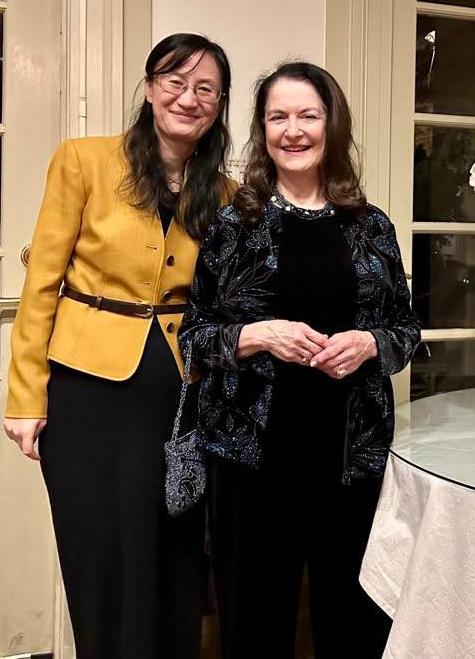
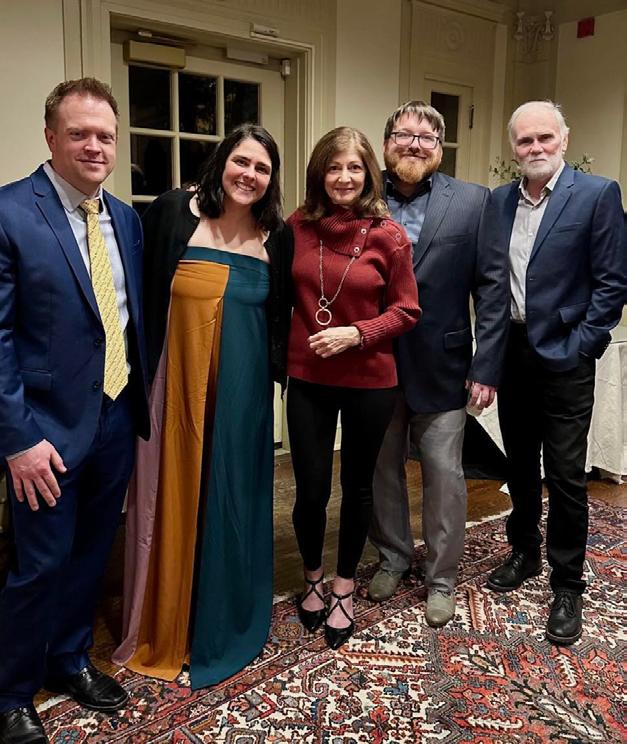

Master of Health Administration team competed at the University of Alabama Birmingham Case Competition as PACE Champions.
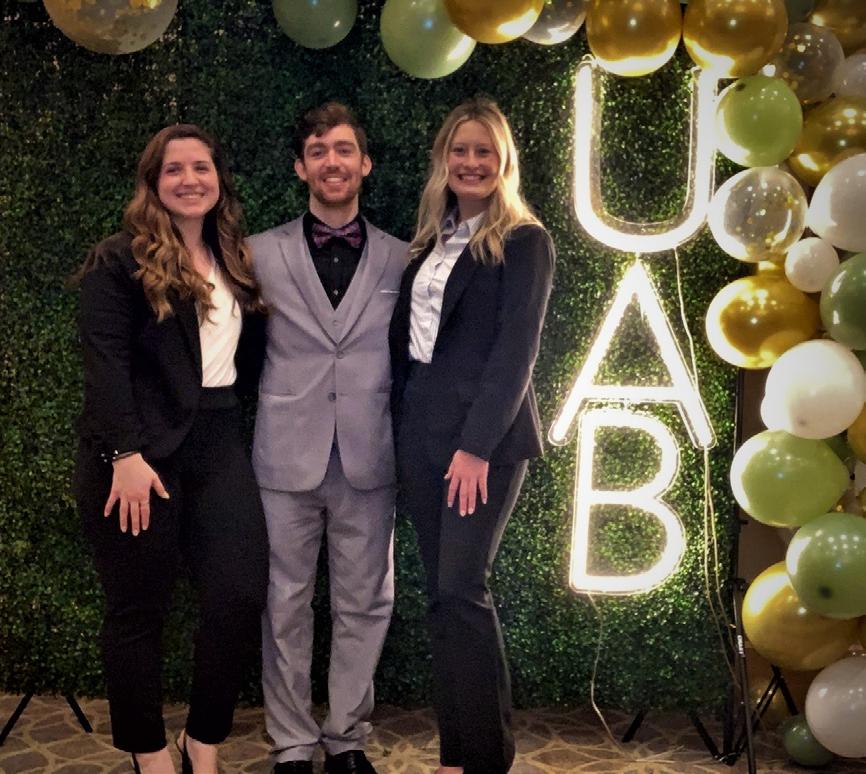
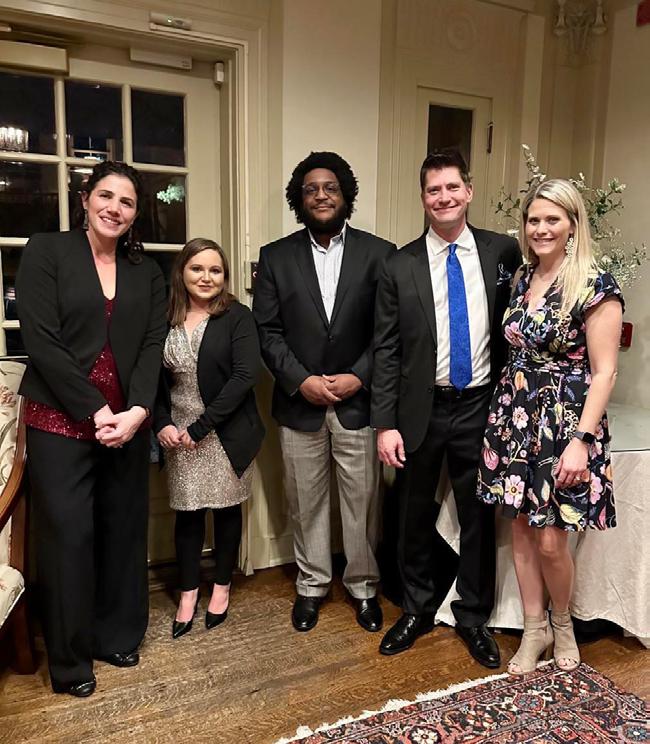
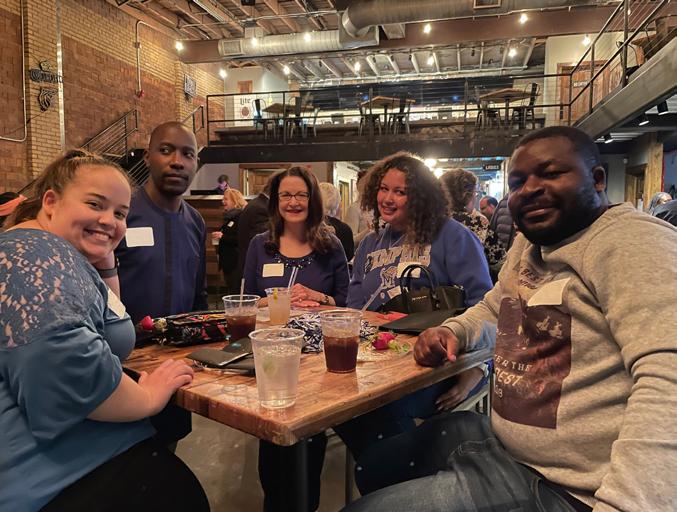
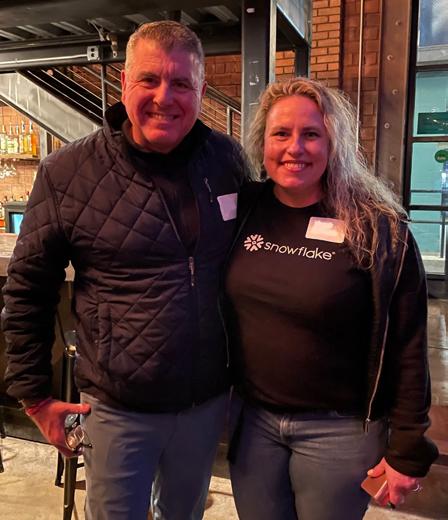

The School of Public Health hosted a networking and social event for students, faculty and alumni.
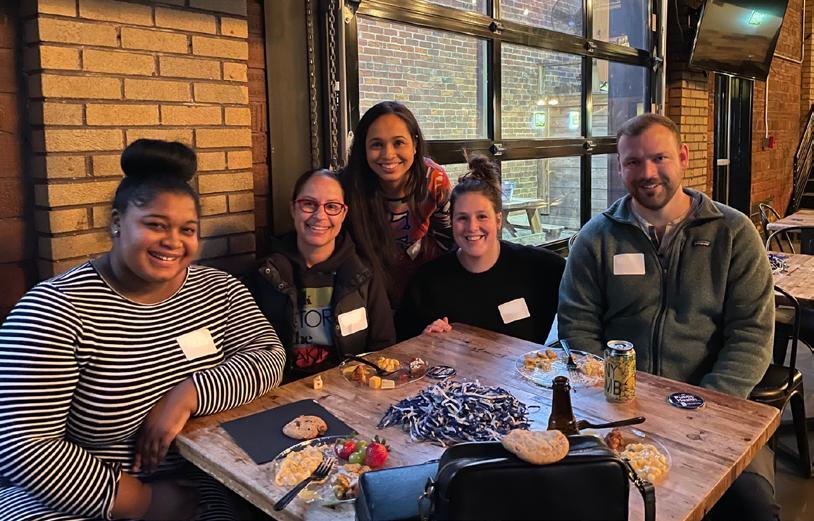
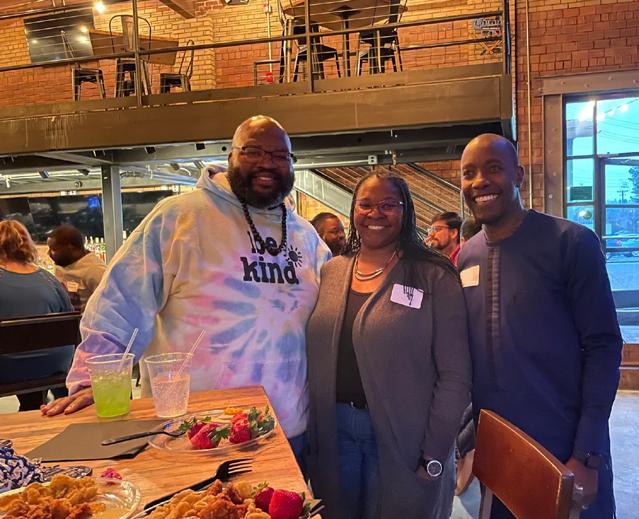
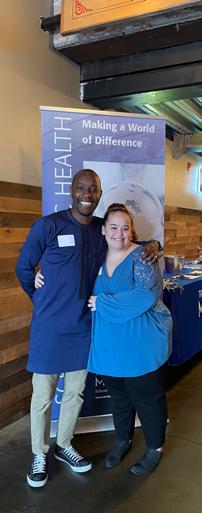
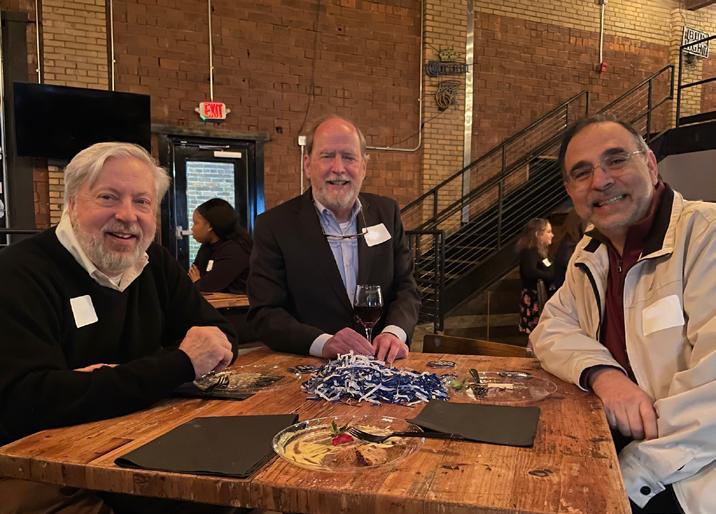
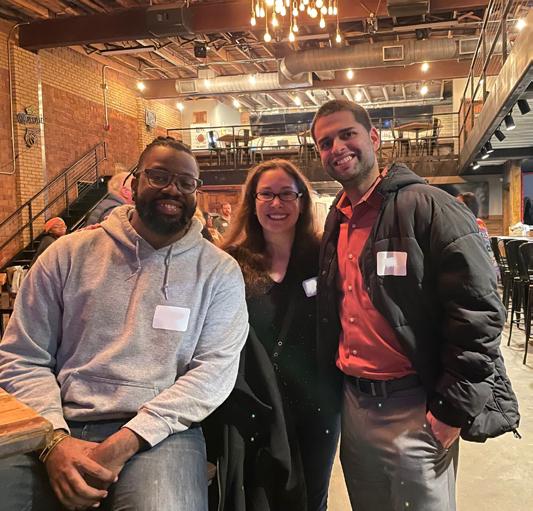

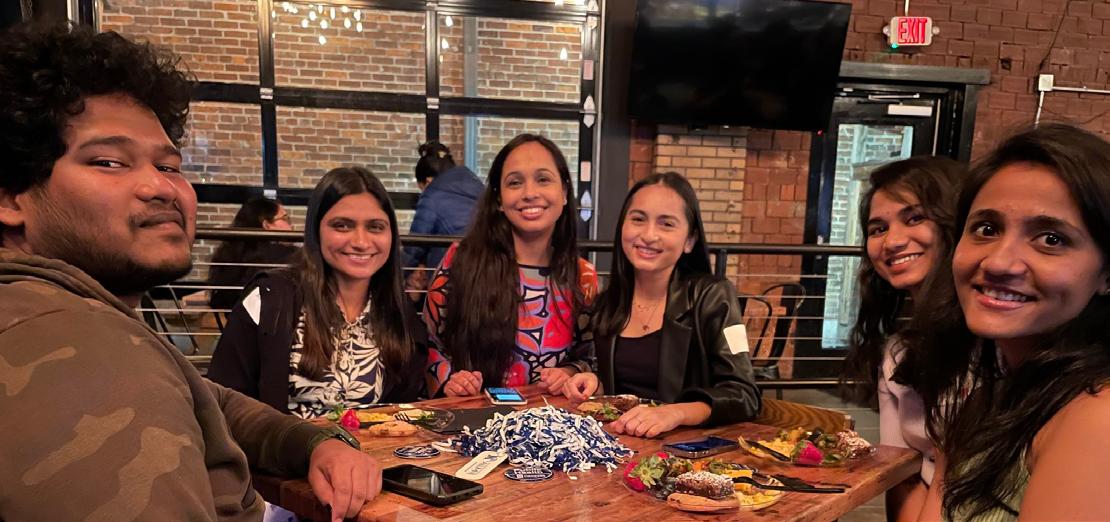
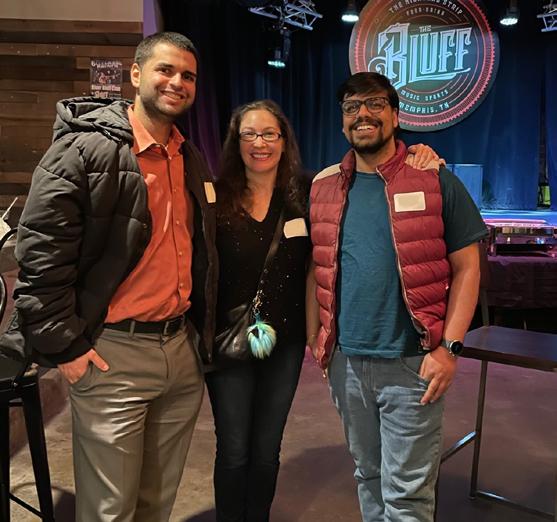
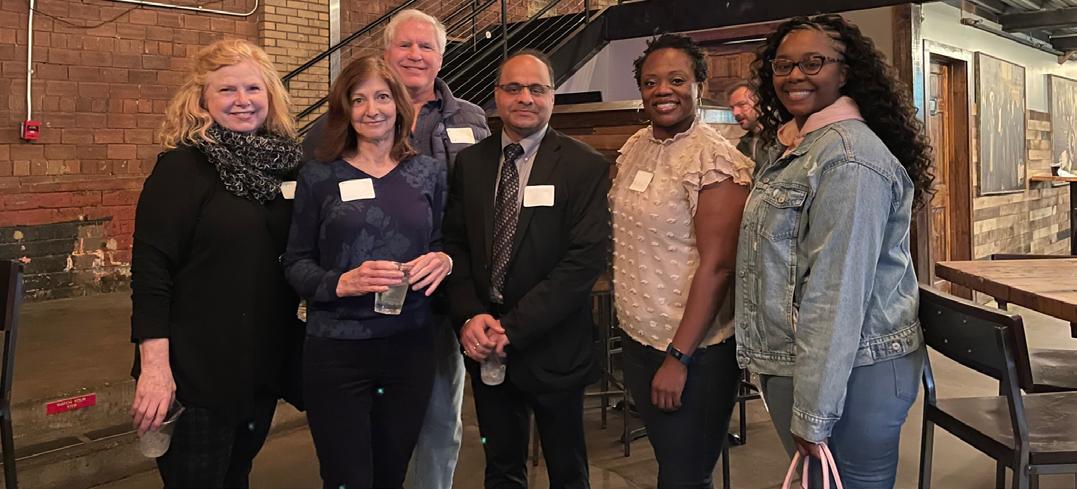
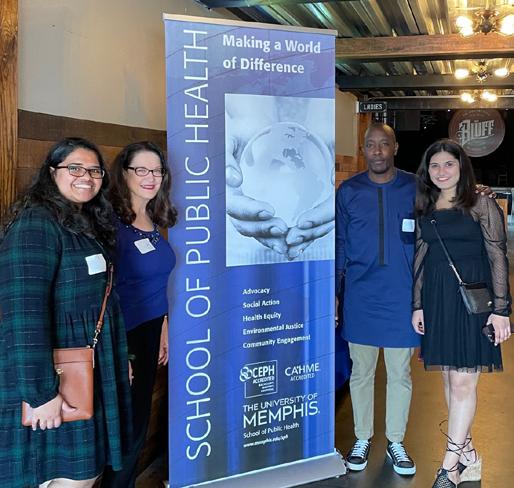
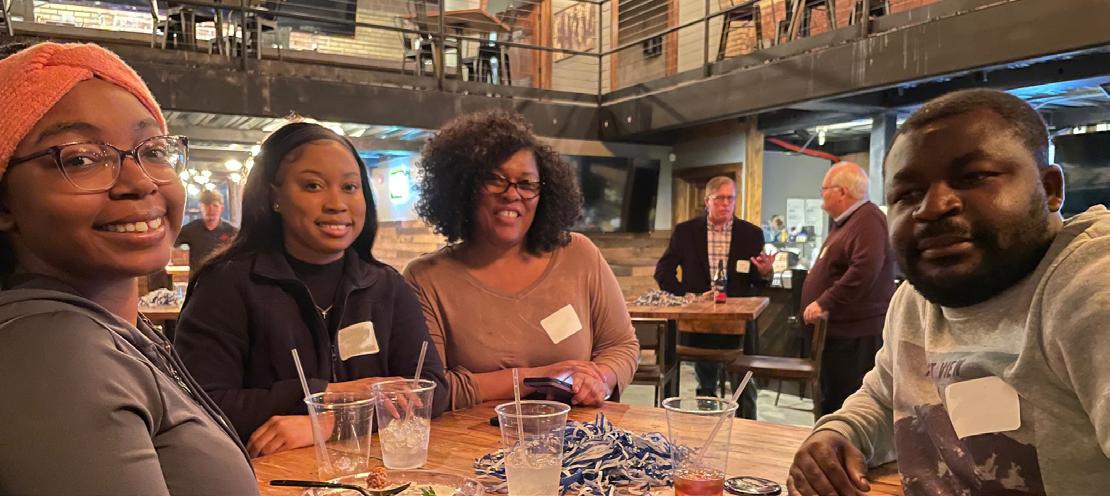
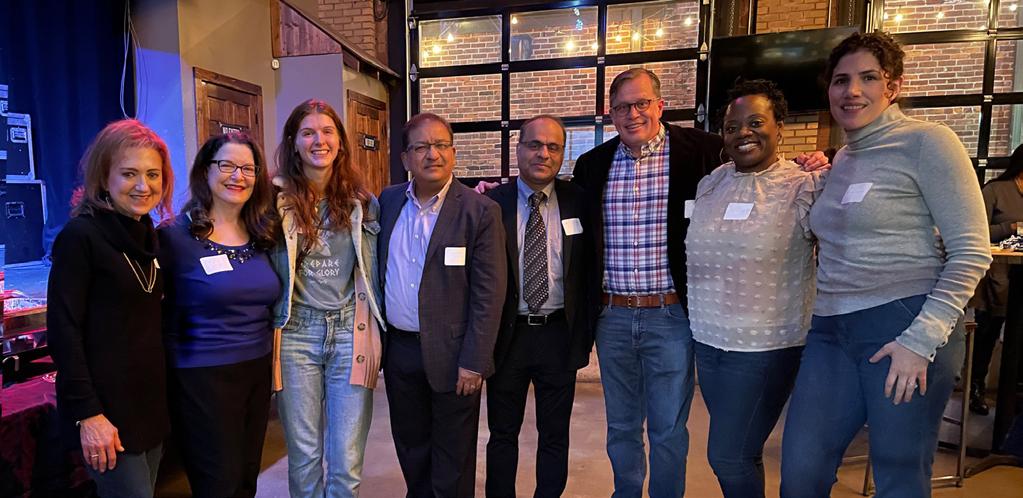


A Betor Way, a local non-profit organization, provided naloxone (Narcan) training to the Public Health Student Assosciation by sharing a unique perspective on the current opioid crisis by telling their own personal stories of addiction and recovery and how that impacts the work they do in the community.
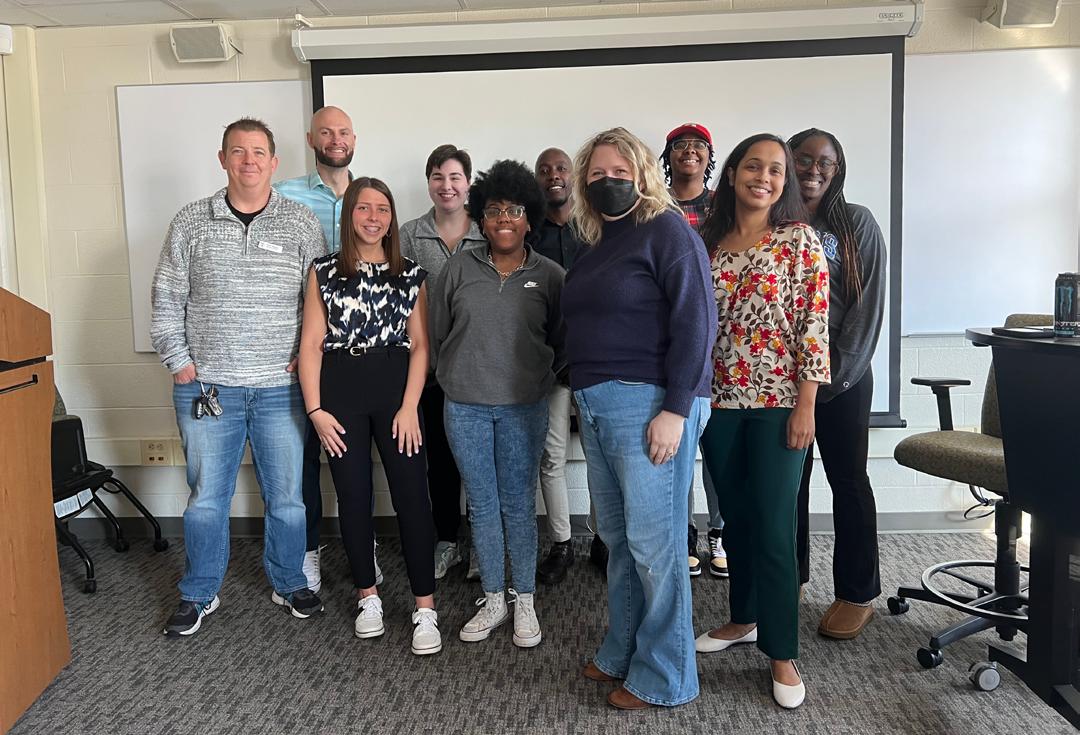
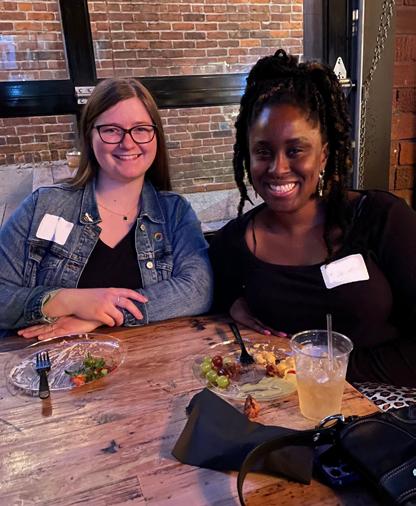



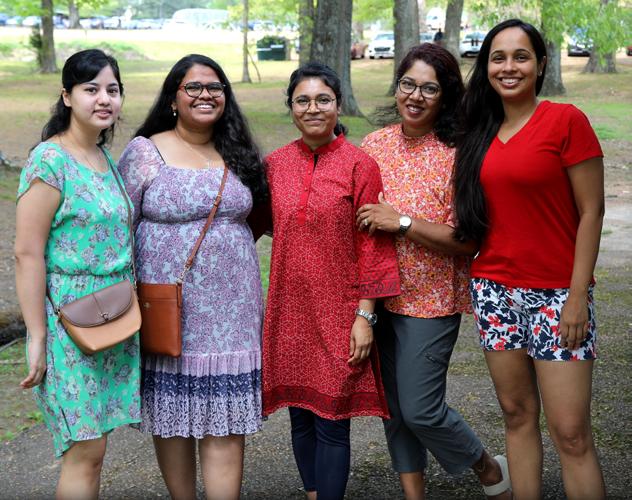
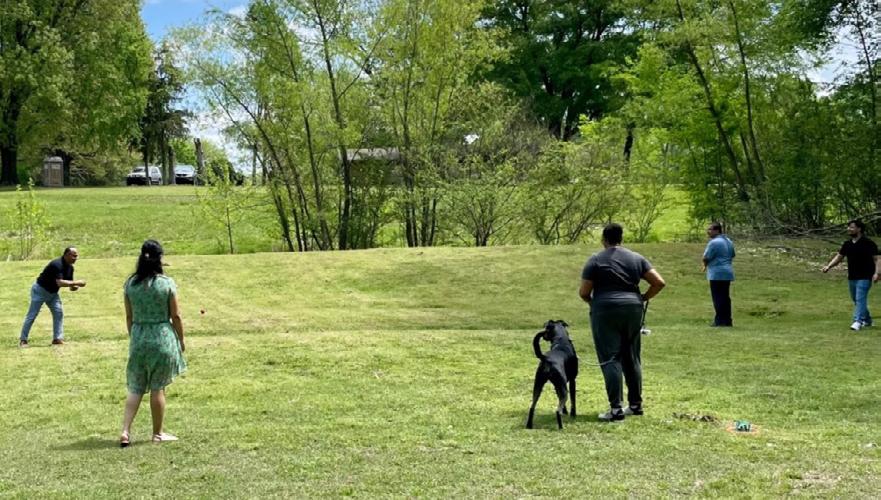
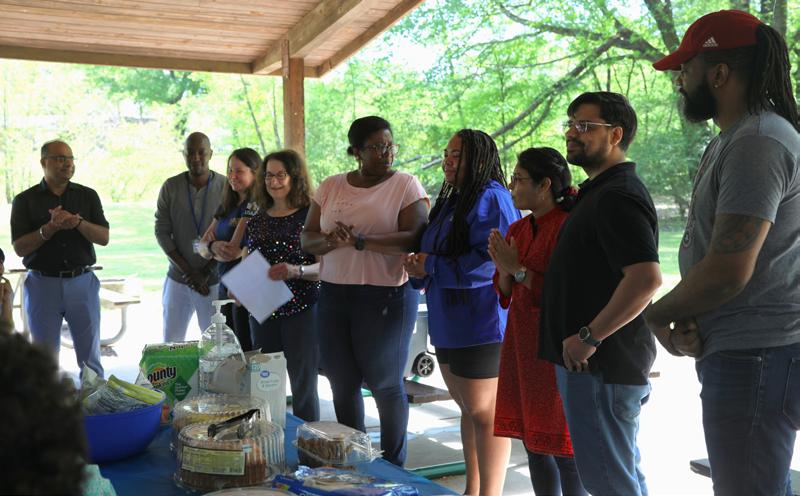
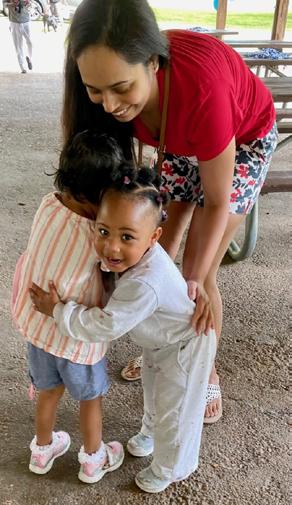
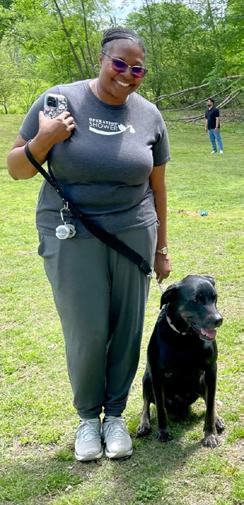
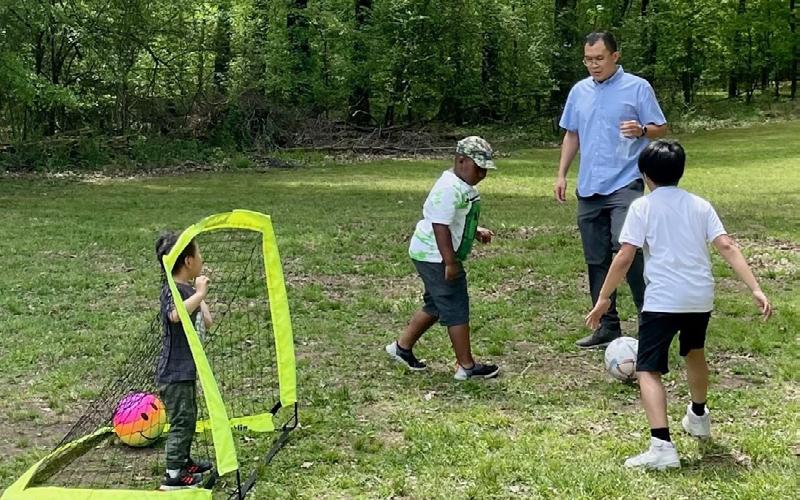
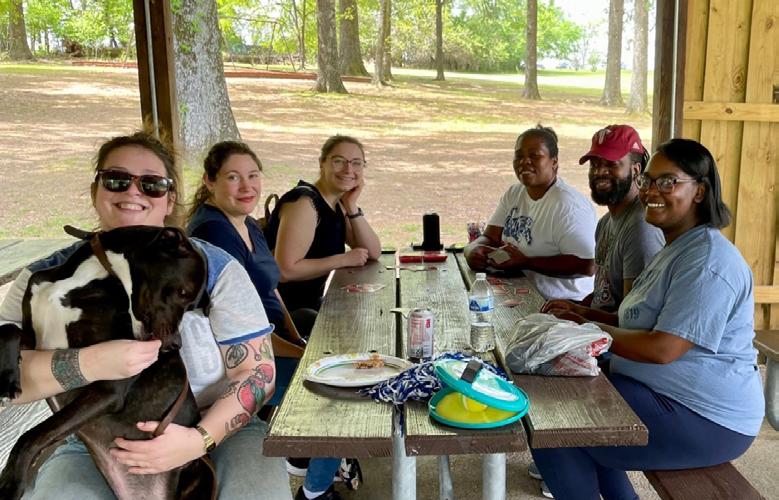
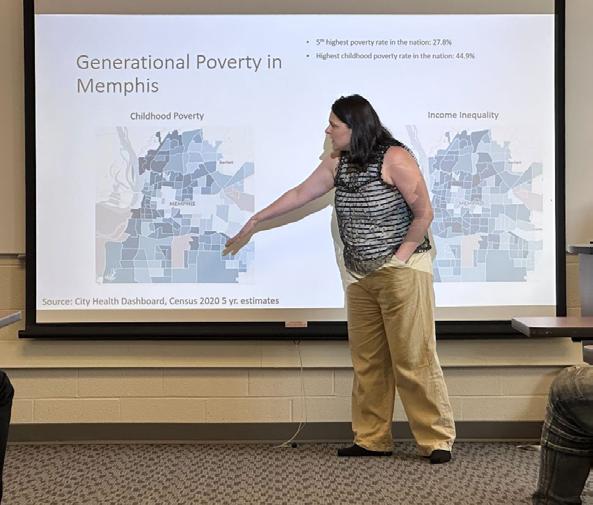
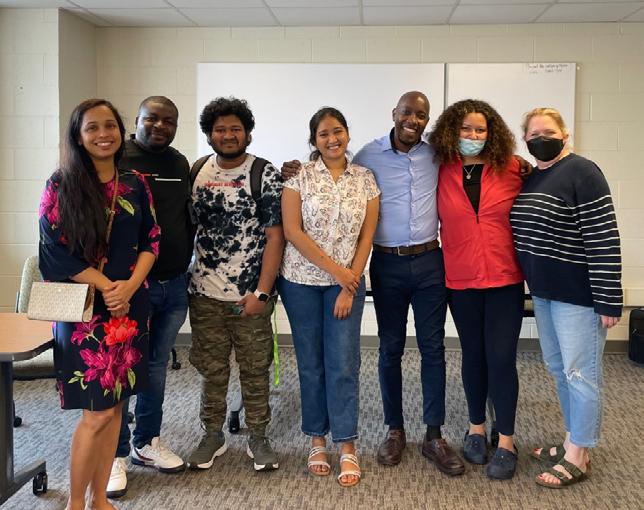
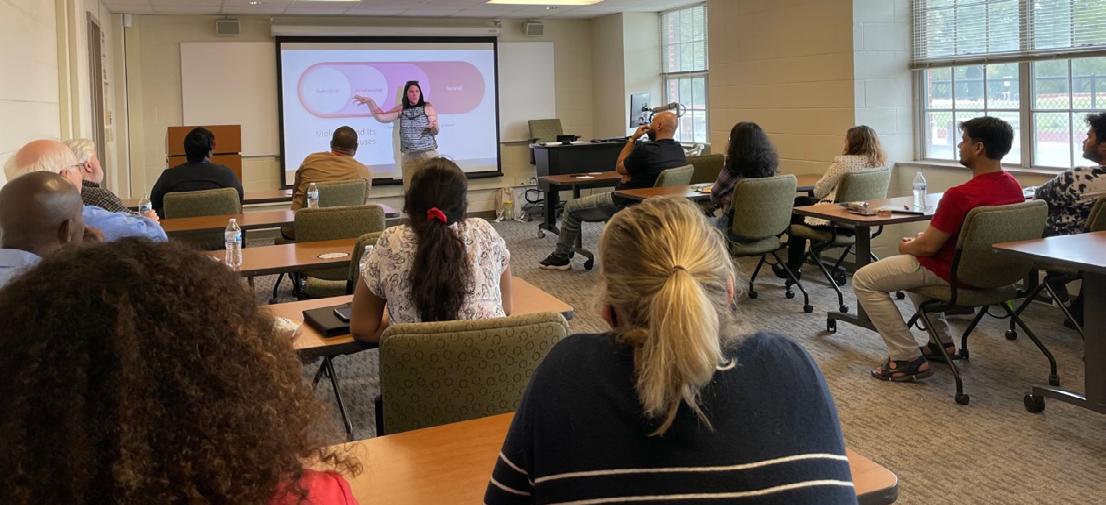
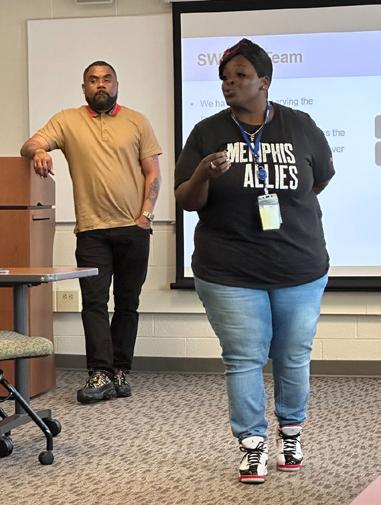
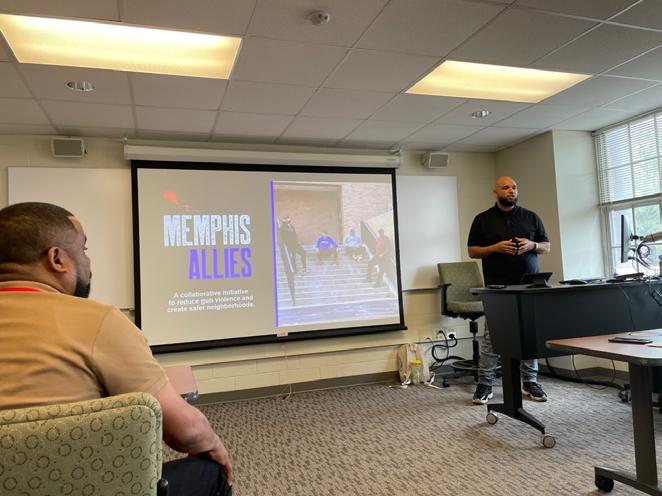
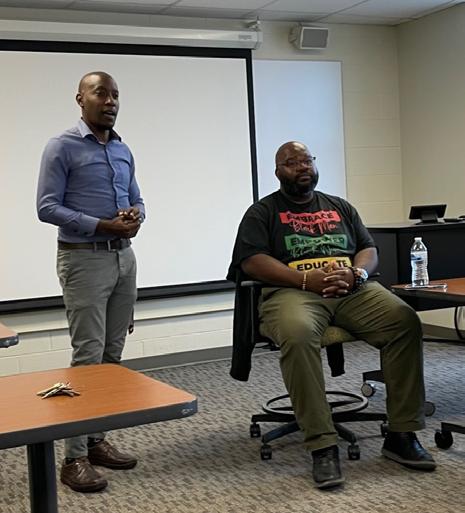
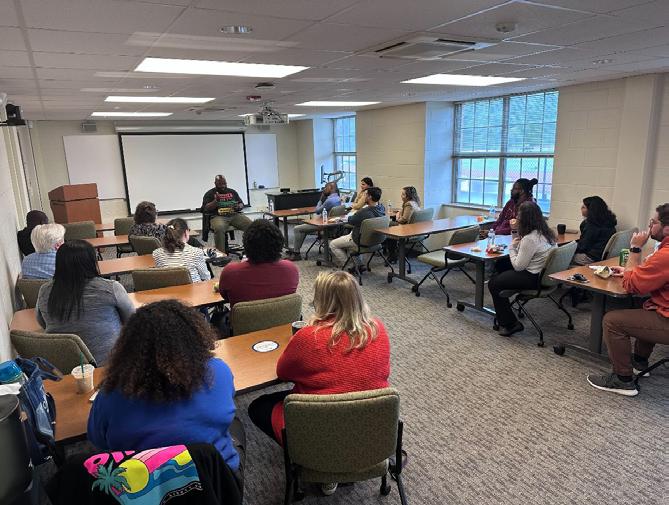
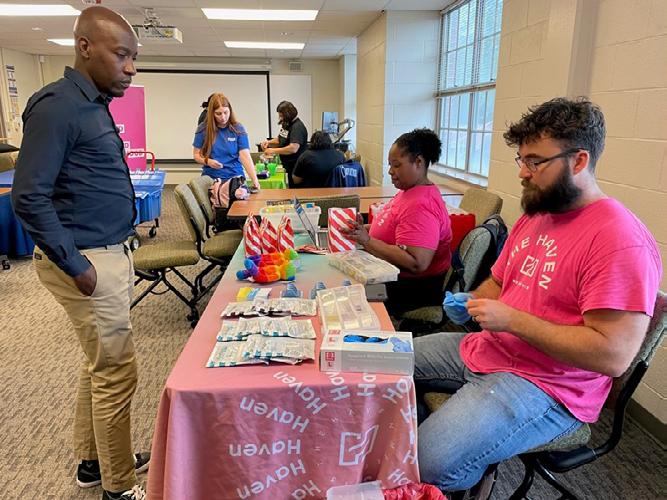
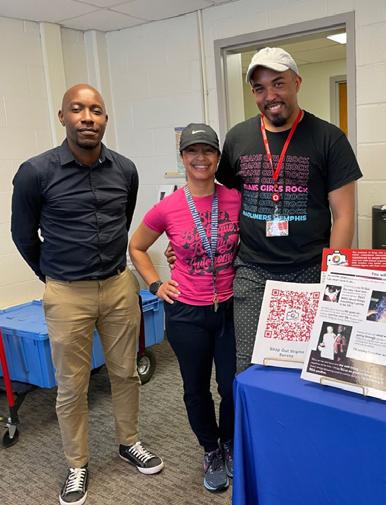
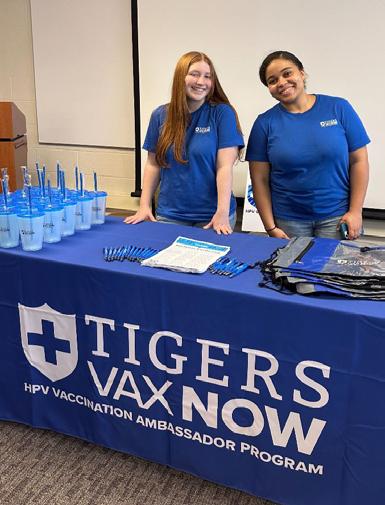
Faculty from the School of Public Health: Marian Levy, Debra Bartelli and Vikki Nolan attended the Association of Schools and Programs in Public Health (ASPPH) Annual Meeting in Arlington, Va. from March 15-17 to present the following topics.
This initiative is designed to unpack, understand and shape the contextual and intervening conditions necessary for underrepresented scholars to thrive professionally and personally and in turn be better able to contribute to and expand health equity-related research.
Seven Schools Awarded Robert Wood Johnson Foundation Grant: University of Memphis, UCLA, University of Southern California, Drexel, Georgia State, Oregon State and University of Missouri.
As one of the seven schools of public health (SPH) funded by the Robert Wood Johnson Foundation (RWJF) to integrate equity, diversity, and inclusion (EDI) into their culture and operations, the University of Memphis School of Public Health (UofM SPH) implemented an interprofessional model to support strategic change.
Funding from the RWJF’s Transforming Academia for Equity (TAE) initiative allowed UofM SPH to create a 10 person guiding team comprised of SPH
administrators; cross-department faculty; graduate students; and EDI champions from three other UofM colleges (Cecil C. Humphreys School of Law, Education and Communication & Fine Arts). This guiding team receives mentorship support from colleagues with EDI expertise at Change Matrix, in partnership with ASPPH.
A key benefit is the opportunity to interact and learn from peers in the other six schools of public health participating in this initiative.
Priority focus areas of the UoM SPH project include: 1) recruitment and retention of underrepresented faculty and staff, 2) examination of tenure and promotion policies that are barriers to equity and 3) recruitment and mentorship of underrepresented doctoral students.
In fall 2022, an initial schoolwide climate survey was conducted to assess faculty, staff, student and alumni perceptions of personal inclusion and equity in SPH policies, practices and culture. Next, a series of eight
Listening Sessions were held with SPH stakeholders (faculty, staff, students and alumni) to elicit feedback to inform our school’s vision and strategic plan of action.
In October, an Academic Equity Fellowship (AEF) program was launched to invest in the mentorship of underrepresented doctoral students and master’s level students aspiring to enter doctoral training and is designed to enhance the pathways of the next generation of diverse scholars. The AEF program introduces graduate students to skills that promote academic equity and
provides resources to succeed in their training and careers in public health.
Each of the 18 recipients of the AEF receives a stipend for attending a total of six, 75-minute interactive sessions held monthly during the 20222023 academic year. We also implemented ongoing cultural humility/anti-bias and inclusion trainings for UofM SPH faculty and staff with sponsorship by a school-wide faculty committee.
In January 2023, focus groups were planned with underrepresented faculty from various
colleges across campus to obtain perspectives about barriers related to academic success for historically excluded scholars and those from marginalized social identity groups.

Using feedback from these assessments, interviews, and workshops, as well as mentorship from experienced EDI leaders, the UofM SPH strives to imbed principles of equity, diversity, and inclusion into the SPH vision/mission and develop a strategic plan that encompasses EDI priorities, recommendations and an action plan.
Current models of public health education in high schools have focused primarily on core public health content in the existing curriculum. It is argued that they have not emphasized critical thinking, engagement, innovation and empowerment. To address this limitation, University of Memphis School of Public Health launched a new initiative, “REAIM Public Health IDEAS through the lens of the Youth,” to introduce public health education in the high schools. This framework relies on the elements of
(continued from page 23)
Research, Entrepreneurship, Analytics, Informatics and Management (REAIM) along the commitment to Inclusivity, Diversity, Equity, Accessibility and Sustainability (IDEAS) to transform ideas into viable solutions for pressing public health challenges of the 21st century.
Through this initiative, youth will actively participate and learn how to acquire, analyze, interpret, apply and evaluate information to comprehend and address health problems in their own communities and globally. It will also cultivate a sense of social responsibility and youth empowerment to engage with community health needs. Public health education in high schools can also help these institutions in getting recognized as flagship schools in public health education; being a well-being hub for developing service orientation for youth and a catalyst for preparing them for public health and other health-related higher education and future workforce.
This initiative aims to adopt a multipronged approach to expand public health education pipeline through

1) launching REAIM Public Health IDEAS Through the lens of the Youth,
2) encouraging dual enrollment for high school students and 3) establishing REAIM Public Health IDEAS club in the high
schools. The “REAIM Public Health IDEAS through the lens of the Youth,” is an innovative initiative aimed to instill Leadership and Educational Advancement among youth to solve Public Health Challenges of the Youth (LEAP). These efforts will assist youth in developing innovative and out-of-box solutions to
address public health challenges of our times. This initiative will also bring together youths’ ideas on how these public health problems can be addressed in diverse local and global settings. Under the public health dual enrollment, we will offer 15 credit hours of undergraduate course work in the junior and senior year of
the high school to introduce them to foundational and applied multidisciplinary core content in public health.

In addition, we will establish REAIM Public Health IDEAS Club in each of the participating high schools to continue to provide students with opportunities to engage in research
and mentorship for future public health and health-related careers.
This initiative will result in public health partnerships, prepare young people for the public health pipeline, and ultimately reduce health inequities in our vulnerable communities.
The goal of this endeavor is to
sensitize youth about critical public health problems and ways in which they can collectively and collaboratively device innovative solutions.
The findings from this initiative will inform and help us evaluate and further improve our dual enrollment curriculum for high schools.
“THE HOPE IS THAT THROUGH THIS INITIATIVE, WE WILL BUILD CAPACITY IN CREATIVITY, RESEARCH, ENTREPRENEURSHIP, WORKFORCE DEVELOPMENT IN PUBLIC HEALTH AMONG YOUTH.”

Debra Bartelli, DrPH, is a research associate professor of Urban Health and the director of Undergraduate Programs at the University of Memphis School of Public Health. In one of her courses, Public Health and Practice II, students apply what they learned in the previous Part I of the course, which included public health practice theories, by working with a community organization. This can involve anything from conducting research on best practice interventions, data collection and analysis, program design and needs assessment. All of which are developing applied skills in students.

Initially, Professor Bartelli reached out to the Shelby County Health Department (SCHD) knowing that they were planning to conduct their next Community Health Needs assessment. Students learned in the previous course about community needs assessments and what they entail. Students from the course helped with the Shelby County Health Department 2022-23 Community Health Needs Assessment, working with SCHD to do focus groups with community members and to develop an online community health assessment survey and the marketing plan to inform the public about the survey.
To create the survey, students attended a training at the SCHD with staff from the Tennessee Health Department who came to Memphis specifically to train the Shelby County Health Department. In the classroom, they learned more about the process of developing surveys and re-
searching what data other Community Health Needs Assessment surveys are collecting.
To prepare for their work with the community organization, students were divided into two teams. One group of students focused on survey development, while the other group focused on the marketing/dissemination plan. They identified areas of the community and organizations that they wanted to be included. Then, midway through the semester, they submitted the plan and draft of the survey to the SCHD for feedback. At the end of the semester, they analyzed the data that had been collected up to that point and submitted a report to the SCHD (around 300 surveys completed at that time).
Throughout the process, the class met twice a week and received supervision and didactic knowledge from Professor Bartelli on one day and presented their progress and received feedback on the other day from her, classmates, and the SCHD.
“It is extremely valuable, students learned a lot of skills and the practical experience that will be beneficial to their continuing studies and to their future careers,” said Bartelli.
Debra Bartelli, DrPH Research Associate Professor of Urban Health Director of Undergraduate Programs
“IT’S A GREAT SERVICE TO THE COMMUNITY FOR COLLEGE STUDENTS TO BE ENGAGED IN WORK LIKE THIS. THE STUDENTS DO EXCELLENT WORK AND ARE VERY PROFESSIONAL.”
Tianna Reese is an undergraduate student in the University of Memphis School of Public Health and one of the students who worked on the 2023 Community Health Needs Assessment for the Shelby County Health Department. She ultimately decided to major in public health because the field combines many of her initial academic interests: healthcare, political science
and social work.
“BEING ABLE TO CONNECT WITH THE WONDERFUL PROFESSORS TEACHING THE CURRICULUM, HEARING FIRST-HAND ACCOUNTS OF THEIR EXPERIENCES AND HOW THEY RELATE TO OUR TOPICS OF STUDY,” said Reese, when asked about her most favored experience as a student so far when learning about public


health concerns from a closer angle.
She has found it thought-provoking having to unlearn the previous incorrect information she had learned about our health system, as well as understanding both how far we have come, but also how far we still have to go to achieve health equity in the United States.
in a team setting. During this project, working alongside professionals in addition to managing a full college schedule, further developed her time management skills and she realized the importance of setting attainable goals and meeting deadlines that will persist with her after graduation. The Shelby County Health department needed assistance and without hesitation, Millenia and her classmates attended events and set up tables to give out the surveys to the public.
“I was always interested in nursing and health,” Millenia said.
been really insightful as it reveals the root cause(s) of many issues that we face today,” she said. She also understands that many individuals do not have someone to advocate for them or ensure they receive quality care. “Taking courses in public health has revealed how far behind we really are and the mistakes we continue to make,” she said.
Millenia Smith is an undergraduate student at the School of Public Health. Along with her classmates in professor Debra Bartelli’s Public Health and Practice II course, she was part of the team of undergraduate students that worked closely with the Shelby County Health Department in designing their 2023 Community Health Needs Assessment during the fall 2022 semester.
Apart from her coursework, this hands-on experience was valuable for Millenia in developing her collaboration and communication skills
“WHETHER IT WAS TAKING CARE OF ONE INDIVIDUAL OR A WHOLE POPULATION, I’VE ALWAYS WANTED TO ASSIST IN PROVIDING CARE OR PROMOTING HEALTH.”
Her choice to study public health was to be a part of the bigger picture, she is passionate about advocating for educational attainment, quality housing, employment, and access to equitable care. After the completion of the course, Millenia had a realization, “Exploring all the social determinants and risk factors that impact health and well-being has
Millenia wants to become an expert in creating awareness and promotion of the harmful factors that are detrimental to the population’s health and well-being and assist in reforming policies while working to solve the bigger picture aspects of public health. She is most concerned with the aspects of poverty and institutional racism and the need for advocacy in the healthcare field for people who need it most.
Courtney Tipper is currently the deputy administrator at the Shelby County Health Department (SCHD), and her background is in Healthcare Administration. Tipper leads operations, compliance, PHAB accreditation, quality improvements, community health needs assessments and marketing strategies.
For the past nine years, Tipper has been involved in a variety of roles and projects with the SCHD. Starting in 2014, following funding awarded from various lawsuits, she partnered with the SCHD to write a grant for tobacco cessation.
Afterward, she was recruited to be the tobacco cessation, adult and maternal health coordi-
When youth are exposed to the ideas of public health at a young age, then they can begin to realize that public health is not [just] about the individual, [but] about community safety by utilizing preventative care options.

Tipper points out that an early introduction to public health also brings awareness to the accessibility of clean drinking water, how individuals who have no health coverage get medical help, understanding emergency preparedness to outbreaks and pandemics like COVID or Hepatitis A and much more.

Employees at the SCHD are excited when students graduate from public health programs as it provides the opportunity to show incoming cohorts that the health department is an organization run just like most organizations. “You don't have to be a doctor or a nurse to work here,” adds Tipper. Ranging from finance to epidemiology, there are various departments and career opportunities available to recent graduates within a health department like the SCHD.
nator. Then, in her position as Healthy Shelby coordinator she led different initiatives across the county to identify strategies to bring all of their hospital partners together and created strategic priorities for a community health assessment.
“IT'S SO IMPORTANT TO BE INTRODUCED TO PUBLIC HEALTH AT A YOUNG AGE… AS EARLY AS HIGH SCHOOL.
TO [BE ABLE TO] UNDERSTAND THE DIFFERENCE BETWEEN PREVENTATIVE HEALTH AND HEALTHCARE.”
How impactful was having the support of these UofM SPH undergraduate students in furthering the mission of the Shelby County Health Department through their involvement in the community health needs assessment?
The Community Health Needs Assessment is an assessment implemented by the SCHD every five years that targets strategic priorities in which to allocate funding toward issue areas. Once the priorities are identified via survey, focus groups and community feedback, the SCHD creates the Community Health Improvement Plan and implements it for four years to address these targeted issues. Then, the Quality Assurance Assessment identifies how much the plan has helped the community. The data extracted helps determine potential future improvements and needed adjustments.
The undergraduate students from the University of Memphis School of Public Health were instrumental in creating the most recent survey for the SCHD, from learning about its purpose to finalizing the most important questions to ask, all within a single semester course. They also took steps to ensure the accessibility of the survey to as many people as possible within the community by making it available in the three most spoken languages in Shelby County: English, Spanish and Arabic. As Tipper
reflects, this helped the SCHD “make sure that we develop the survey in a way that no matter who you are, you can complete [it] and it makes sense to you.”
Students also took the initiative to identify the best locations to distribute the survey and implemented marketing strategies via social media to get people’s attention. When barriers arose in various zip code communities, the students modified questions accordingly for those demographics. “The students really helped us build capacity in our reach.],” she said. The SCHD has limited staffing, and the students worked independently to complete the survey and also assisted with running focus groups, which was a huge help for the SCHD team.
How does the SCHD hope to use the Community Health Needs Assessment results to better public health in Shelby County communities?
“The Community Health Needs Assessment is feedback from the community," said Tipper. It will address different needs each time it is completed.

Tipper concludes:
“Public Health is a career path with a variety of opportunities and [the field] needs more exposure as to why it is [so important] in the community.”
“The Community Health Needs Assessment is feedback from the community," said Tipper.
During his undergraduate studies in statistics, Nahian Abrar was “highly amazed by how the theories of statistics shaped the modern-day application of data science and machine learning.” He became most interested in the applicative side of statistical modeling and coding.

Abrar grew up in the developing country of Bangladesh. He witnessed how far behind his country is in the healthcare sector due to a lack of regulatory frameworks, research opportunities and skilled analysts. He reflects that “the decision to pursue a degree from the School of Public Health has been [his] dream to contribute to the development of the healthcare sector by applying [his] research skills as a biostatistician.”
During his studies, the most enjoyable experience has been working with real-life health

data, inferring about health and disease outcomes and learning a lot about the epidemiological trends of public health. Abrar states that as a graduate research assistant, “completing course curriculums and simultaneously doing research work on multiple studies has been the most challenging [aspect]. This has shaped [him] to be a more methodological person; to be prompt and succinct in every work.” Ultimately, his goal is to join the medical or pharmaceutical research industry as a biostatistical analyst.
Encouraged by Dr. Joyce Jiang, an associate professor of Biostatistics in the School of Public Health, Abrar has presented his research at the Memphis Big Data Conference at the FedEx Business Institute and at the American Statistical Association West Tennessee Chapter. His presentation was regarding the methodology and guidelines on how to report results from mediation analyses, which use a model to help explain the relationship between two variables using a third hypothetical variable: the mediating variable or mediator.
Under the supervision of Jiang, one aspect of his PhD project was a mediation analysis on the relationship between DNA methylation at birth and asthma transition during adolescence
with lung function serving as the mediator.
Currently, Abrar is working with his advisor Jiang on several projects, one of which is with the University of Tennessee Health Science Center (UTHSC) on the topic of veterans, which is in its early data collection stage. Another topic is focused on sepsis research in collaboration with the University of Memphis nursing department, which is currently in the second data collection stage. This data is being collected from most of the hospitals in the United States, and the researchers are looking at potential factors that significantly cause readmission in a hospital within 90 days after being treated for sepsis.
In his graduate studies, Abrar has learned how to create coherence in his projects and papers. Additionally, he finds it exciting working with large data sets and how once the research is completed, the results can benefit broader communities nationally and internationally. In the future, Abrar dreams about returning to Bangladesh to work in the public health sector that has a dire need for data analysts and other experts in the field.
With a background as a clinical health psychologist, Kenneth Ward, PhD, professor and director of the Division of Social and Behavioral Sciences and adjunct professor of Preventive Medicine at the University of Tennessee College of Medicine, research focuses on community, healthcare systems, and population-level approaches to reduce the burden of tobacco use as well as chronic disease prevention. As a certified tobacco treatment specialist, he is especially interested in improving methods to help smokers quit. Ward does consulting in the local community of Memphis as well as running a group for organizations to inform them on how to help people to quit smoking. In addition, he also helped to establish a tobacco Research Center in the Eastern Mediterranean region: The Syrian Center for Tobacco Studies. Ward was part of a team that developed a smoking cessation program that was disseminated into Syria’s primary care system.
Ward obtained his MS and PhD degrees in clinical psychology from the UofM Psychology Department. In the early aspects of his career, Ward worked as a research project coordinator in cardiovascular epidemiology at the Harvard Medical School. His interest in studying clinical psychology at the graduate level brought him to Memphis. In 1993, just shortly before his graduation, his advisor was in the early stage of creating the School


of Public Health. Ward was the first faculty hired to jumpstart the process. During the initial groundwork years, Ward did evaluation work and started a research program. He obtained a tenured position and was the director for a unit called the “Center for Community Health.” This center provided health related grantsmanship assistance for faculty from six different colleges on campus. Later, he became an associate professor of health promotion in the UofM Department of Health and Sport Sciences (now called the College of Health Sciences.)
In 2008, Ward officially moved his position to the School of Public Health when Dr. Lisa Klesges, the founding dean, began the process of creating the SPH within the College of Arts & Sciences. “Mentoring both students and junior faculty to have successful public health, research and teaching careers”, Ward adds, is his favorite aspect of the job.
In today’s modern society, the public health field is at the forefront of finding solutions. Public health offers multidisciplinary approaches to solving problems in the local and global community. Working with people with different specializations and skill sets makes problem solving more efficient. It also creates a fun working environment working with others who have different interests and passions.
“FOLLOW YOUR PASSION; THERE ARE SO MANY DIRECTIONS YOU CAN TAKE IN THE FIELD AND HAVE A SUCCESSFUL CAREER. AS A PUBLIC HEALTH PROFESSIONAL, THERE ARE OPPORTUNITIES IN ACADEMIA, GOVERNMENT AND OTHER HEALTH RELATED ORGANIZATIONS WHERE YOU CAN FIND A REWARDING PATH THAT YOU FIND ENJOYABLE.”
Jessica Bell-Johnson is a graduate of the Master of Public Health program with a concentration in Epidemiology (2018). She currently works at the CDC as the PH LEADS (Public Health Leadership and Education, Advancing Health Equity and Data Science) Program Coordinator, where she is the curriculum designer for the ASPPH fellowship as well as the PH LEADS program liaison with CDC partners. Bell-Johnson notes that developing the fellowship curriculum allows her to see “where we are in public health, what direction we want to go with our fellows, and what we feel like they need to know to be well rounded public health officials once they leave.”

As a former graduate student, with no prior knowledge of public health, Bell-Johnson applied to the UofM School of Public Health due to its Council on Education for Public Health (CEPH) accreditation. This

accreditation also allowed her to join the Association of Schools & Programs of Public Health (ASPPH) Fellowship.
During her studies, she received a well-rounded education alongside her more concentrated epidemiology coursework. Under the guidance of Dr. Xinhua Yu, Jessica’s graduate practicum was on Mortality in the U.S. vs. Shelby County for those that suffered from pneumoconiosis, an occupational lung disease caused by dust inhalation that most often impacts coal miners.
In her first fellowship year (out of a total of four), she studied Occupational Lung Diseases in Morgantown, West Virginia. The primary focus was on black lung in coal workers and different forms of pneumoconiosis for construction workers and welders; that fellowship position became a permanent position with the CDC for Jessica as an early career professional.
In her current position as the PH LEADS Program Coordinator, Bell-Johnson fulfils many important roles for the CDC and their primary/ secondary external partners. She notes that “public health is intertwined in most areas of our life,” particularly in public policy where politicians dictate our safety regulations in many aspects of society, such as safer work-place settings. Bell-Johnson also adds that “during the pandemic, we saw how important public health is and how having these different practices... and different mechanisms in place to protect the health of the public is really important.”
If you are in your early career path,
Bell-Johnson advises taking advantage of the Fellowship positions available, which offer extremely valuable support and guidance. For those that have obtained their Bachelor’s degree and want to be a part of larger scale work for the government, consider obtaining an advanced degree such as an MPH, PhD or DrPH. If you already have a Master's or Doctorate degree background, “be excited,; the world of public health is really on the forefront now, and there are a lot of opportunities for early career professionals.”
“IT'S IMPORTANT TO UNDERSTAND THAT THE NUMBERS YOU'RE WORKING WITH ARE PEOPLE. IF YOU HAVE THE OPPORTUNITY TO MEET AND TALK TO PEOPLE THAT REALLY MAKE AN IMPACT ON YOUR WORK, IT CAN MAKE IT FEEL EVEN MORE MEANINGFUL THAN IT ALREADY IS.”Jessical Bell-Johnson MPH in Epidemiology (2018) Programs Coordinator, CDC
Dr. Nikhil Ahuja, PhD, MDS, BDS is an assistant professor in the Department of Public Health, College of Health Professions, at Slippery Rock University in Pennsylvania. His current research interests include addressing tobacco/e-cigarettes, opioids, and other substance use issues, especially among youth/young adults, underserved groups or racial minority populations in the U.S. He received his PhD in Social and Behavioral Sciences from the School of Public Health at the University of Memphis.
He reflects that studying at the UofM School of Public Health “has helped [him] a great deal in applying some of the public health concepts in the real world and improved [his] oral and written communication skills.” Ahuja learned how to conduct public health research, publish research papers, write grant proposals and develop collaborations with the community. These experiences helped him to secure his first tenure-track assistant professor position.
The negative impact on people’s health and lives in the last couple of years due to COVID-19 has made public health even more important in today’s world. He adds, “it is now important that governments and organizations continue to improve and invest in public health programs and research for the betterment of people’s health and well-being. We are seeing an increase in health-related disparities in different populations and sub-groups nationally and internationally.”
Ahuja believes “the public health field is broad and diverse, bringing together experts with very different backgrounds and perspectives nationally and internationally. If someone is really interested

in bringing about a change in the community, then a public health career provides them with that opportunity.”
He concludes that “it is an exciting time to be in public health, as it not only helps you to make a career out of it, but you also get the opportunity to improve the health of the community. A public health degree is satisfying both personally and professionally.”

“ALTHOUGH WE HAVE SEEN GREAT ADVANCES IN PUBLIC HEALTH OVER THE YEARS, WE STILL SEE INCREASING PREVALENCE OF HEART DISEASE, CANCER, AND DIABETES, TO INFECTIOUS DISEASES AND ENVIRONMENTAL HAZARDS IN THE US AND GLOBALLY.”Nikhil Ahuja, PhD, MDS, BDS Assistant Professor Dept. of Public Health, Slippery Rock University
Dr. Daniel F. Sarpong, is a senior research scientist in the Department of General Internal Medicine and executive director of the Office of Health Equity Research (OHER) at the Yale School of Medicine. Sarpong’s research focuses on translational research exploring innovative approaches to mitigating biological and social determinants of health disparities in primarily chronic diseases. Before joining Yale University in the School of Medicine, he was a tenured professor of Biostatistics, Endowed Chair of Health Disparities, and director of the Center for Minority Health and Health Disparities (CMHDRE) at the Xavier University of Louisiana. Additionally, he served as the director of the Community Engagement Cores of Xavier RCMI Cancer Center and the Louisiana Clinical and Translational Science (LA CaTS) Center. Between 2000 and 2010, he held myriad leadership positions including: director and Co-Principal Investigator of the Jackson Heart Study Coordinating Center (JHSCC), the director of Data Management, Quality Assurance, and Information Technology, and the senior biostatistician of the JHSCC at Jackson State University.

Dr. Emmanuel Tsekleves leads Design for Global Health at Imagination Lancaster, Lancaster University. Tsekleves is a multicultural and multidisciplinary researcher with 15+ years of experience successfully working with collaborators globally across Africa, Southeast Asia, Latin America and Europe. His work revolves around solving complex issues and combining academic research with business acumen to translate insights into sustainable solutions in the health, food and green economy industries. Driven by the UN’s Sustainable Development Goals, his research focuses on tackling community health challenges across the world and his work has significantly contributed towards the development and winning of various proposals.

William Yotive is currently the Model UN coordinator for the World Federation of United Nations Associations (WFUNA). He is responsible for organizing WFUNA’s Model UN programs around the world, which includes conducting trainings on how to accurately simulate a wide range of UN bodies including all the main UN Organs as well as some Subsidiary Organs and Specialized Agencies. Yotive also served as the curriculum director for the WFUNA summer youth program in the Republic of Korea that focused on teaching students at the primary, intermediate and secondary level about the UN’s Sustainable Development Goals. Prior to working at WFUNA, Yotive was project manager of the United Nations Global Teaching and Learning Project within the Outreach Division of the UN Department of Public Information from 2001-15. In that position, he was responsible for creating educational materials for schools around the world regarding the United Nations and global issues on the UN agenda along with organizing various global videoconferences for students and teachers each year at UN Headquarters. Yotive is an advisory council member of the Committee on Teaching about the United Nations and also serves on the International Institute on Peace Education Transnational Advisory Group.

Every year the University of Memphis celebrates those faculty who have attained $1 million or more as Principal Investigator on externally supported sponsored projects. We are honored to count this group of distinguished researchers as faculty at the University of Memphis.
Dr. Marian Levy
Dr. Matthew Smeltzer
FY22 FIRST-TIME PRINCIPAL INVESTIGATORS

Dr. Jennifer Turchi
Dr. Yu (Joyce) Jiang
Dr. Abu Mohammed Naser Titu
Mark Hendricks
As part of the University’s push for top-tier Carnegie R1 status, the Office of the Provost and the Division of Research and Innovation have partnered to celebrate research excellence on campus. As part of that recognition, they have awarded 20 professorships to various university of memphis faculty, including:
Dr. Satish Kedia
Dr. Latrice Pichon
Dr. Matthew Smeltzer
Dr. Hongmei Zhang
FY22 PRINCIPAL INVESTIGATORS
Dr. Debra Bartelli
Mark Hendricks
Dr. Chunrong Jia
Dr. Yu Jiang
Dr. Satish Kedia
Dr. Marian Levy
Dr. Courtnee Melton-Fant
Dr. Fawaz Mzayek
Dr. Latrice Pichon
Dr. Matthew Smeltzer
Dr. Abu Mohammed Naser Titu
Dr. Jennifer Turchi
Dr. Kenneth Ward
Dr. Hongmei Zhang

Dr. Kenneth Ward, Social and Behavioral Sciences division director and professor was recognized as one of the university’s top faculty for research impact. Ward has published more than 200 research articles and impact was judged based on the Scopus H-Index.
Dr. Meghan Meadows-Taylor was recognized by the Division of Research & Innovation at the University of Memphis for her outstanding work as the pre-award coordinator for the School of Public Health.
Dr. Meghan Meadows-Taylor was nominated by the readers of the Memphis Flyer as part of the 20 Under 30 Class of 2023. In March of 2020, at the early stages of the coronavirus pandemic, Meadows-Taylor earned her PhD in Epidemiology. During the same year, she was in charge of a $13 million CDC grant to the Shelby County Health Department to serve under-resourced populations.
At the 6th Annual Excellence Awards Ceremony, Shirl Sharpe, academic coordinator II, was nominatedfor the TIAA Excellence Award.
NIH Grant for $433K with Dr. Titu as Principal Investigator (PI)
The University of Memphis will receive a $433,349 grant from the National Institute of Environmental Health Sciences (NIEHS) for a project entitled “Effect of ambient heat on chronic kidney disease and end-stage kidney disease among U.S. veterans” under the direction of School of Public Health Assistant Professor Abu Mohammed Naser
Titu.CDC Awards $107K to continue Dr. Pichon’s HIV Research
Dr. Latrice C. Pichon, associate professor of Social and Behavioral Sciences of the School of Public Health, Division of Social and Behavioral Sciences, has received a continuation of funding for Year 3 for a Centers for Disease Control and Preventionfunded, sub-award grant through Vanderbilt University Medical Center (PI: Pettit), for her project “Implementation of Rapid HIV Testing and Linkage to HIV Treatment or Prevention
Among Vulnerable Populations in Tennessee,” amounting to $107,624 for her contribution on the Rapid ART Core Project to facilitate stigma reduction strategies. Pichon and her graduate assistant, Cris Valdebenito, look forward to continuing to work with Memphis community members and partner organizations.
$10 Million Grant from EPA in collaboration with RTI International
The U.S. Environmental Protection Agency (EPA) granted the nonprofit research institute RTI International with $10 million to serve communities throughout EPA Region 4, where RTI will coordinate an environmental justice center: “Resource for Assistance and Community Training – Region 4 (REACT4EJ).”
The University of Memphis is one of seven schools in the region (along with the University of Georgia, the University of Kentucky, the University of South Carolina, Alabama A&M University, Florida A&M University, Jackson State University and North Carolina Central University) that will partner with RTI as part of this research initiative for environmental justice in underserved communities.
Dr. Chunrong Jia, professor of environmental health in the School of Public Health (SPH), serves as the Principal Investigator (PI) for the University of Memphis. The co-investigators include Dr. Ashish Josh, professor and dean of the SPH, Dr. Naser Titu, assistant professor of Environmental Health in the SPH and Dr. Arleen Hill, professor and chair of Earth Sciences at the University of Memphis.
Medical College along with CDC awards Dr. Pichon $95K for the project on Rapid HIV Testing
Dr. Latrice Pichon, associate professor in the Department of Social and Behavioral Sciences, was awarded $94,673 from Meharry Medical College with the Center for Disease Control for her project “Implementation of Rapid HIV Testing and Linkage to HIV Treatment or Prevention Among Vulnerable Populations in Tennessee.”
$42K To Dr. Turchi
Dr. Jennifer Turchi, assistant professor in the Department of Social and Behavioral Sciences, was awarded $41,725 from First 8 Memphis LLC for her project “Seeding Success Pre-K Outcomes-Based Financing Project.”



